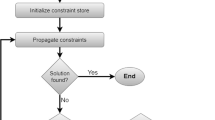Abstract
Numerous operational constraints within both industry and service sectors mandate the concurrent scheduling of tasks. This need is particularly evident in the assembly of products within manufacturing processes. This paper concentrates on minimizing makespan in the two-stage assembly flow shop problem. Our contributions include the introduction of novel dominance rules, a proposal for a heuristic method, and the development of a branch and bound algorithm. Additionally, we conduct an empirical analysis of makespan distribution for small-size instances. Through extensive experimentation, our study demonstrates the efficiency of the introduced dominance rules and the strong performance of the developed branch and bound algorithm.




Similar content being viewed by others
References
Framinan JM, Perez-Gonzalez P, Fernandez-Viagas V (2019) Deterministic assembly scheduling problems: a review and classification of concurrent-type scheduling models and solution procedures. Eur J Oper Res 273:401–417
Dridi N, Hadda H, Hajri-Gabouj S (2009) Heuristic method applied to the hybrid flow shop problem with dedicated machines. RAIRO Oper Res 43:421–436
Hadda H, Dridi N, Hajri-Gabouj S (2007) The two-stage assembly flow shop scheduling with an availability constraint. In: Proc. 3rd Multidisciplinary International Conference on scheduling: theory and application, Paris, France, pp 184–191
Hadda H, Dridi N, Hajri-Gabouj S (2014a) Exact resolution of the two-stage hybrid flow shop with dedicated machines. Optim Lett 8:2329–2339
Hadda H, Dridi N, Hajri-Gabouj S (2014b) The two-stage assembly flow shop scheduling with an availability constraint: worst case analysis. J Math Model Algorithms Oper Res 13:233–245
Hadda H, Hajji MK, Dridi N (2015) On the two-stage Hybrid flow shop with dedicated machines. RAIRO Oper Res 49:795–804
Hadda H, Dridi N, Hajji MK (2018) On the optimality conditions of the two-machine flow shop problem. Eur J Oper Res 266:426–435
Haouari M, Daouas T (1999) Optimal scheduling of the 3-machine assembly-type flow shop. RAIRO Oper Res 33:439–445
Hariri AMA, Potts CN (1997) A branch and bound algorithm for the two-stage assembly scheduling problem. Eur J Oper Res 103:547–556
Johnson SM (1954) Optimal two- and three-stage production schedules with setup times included. Res Log Q 1:61–68
Komaki GM, Sheikh Shaya, Malakooti Behnam (2019) Scheduling problems with assembly operations: a review and new trends. Int J Prod Res 57:2926–2955
Koulamas C, Kyparisis GJ (2001) The three-stage assembly flowshop scheduling problem. Comput Oper Res 28:689–704
Koulamas C, Kyparisis GJ (2007) A note on the two-stage assembly flow shop scheduling problem with uniform parallel machines. Eur J Oper Res 182:945–951
Lee CY, Cheng TCE, Lin BMT (1993) Minimizing the makespan in the 3-machine assembly-type flowshop scheduling problem. Manag Sci 39:616–625
Navaeia J, Ghomib SMTF, Jolaic F, Mozdgird A (2014) Heuristics for an assembly flow-shop with non-identical assembly machines and sequence dependent setup times to minimize sum of holding and delay costs. Comput Oper Res 44:52–65
Nawaz M, Enscore EE, Ham I (1983) A heuristic algorithm for the m-machine, n-job flowshop sequencing problem. Omega 11:91–95
Potts CN, Sevast’janov SV, Strusevich VA, Van wassenhove LN, Zwaneveld CM (1995) The two-stage assembly scheduling problem: complexity and approximation. Oper Res 43:346–355
Shoaardebili N, Fattahi P (2015) Multi-objective meta-heuristics to solve three-stage assembly flow shop scheduling problem with machine availability constraints. Int J Prod Res 53:944–968
Xi S, Kazuko M, Hiroyuki N (2003) Powerful heuristics to minimize makespan in fixed, 3-machine, assembly-type flowshop scheduling. Eur J Oper Res 146:498–516
Yokoyama M (2004) Scheduling for Two-Stage Production System with Setup and Assembly Operations. Comput Oper Res 31:2063–2078
Funding
No funding was received.
Author information
Authors and Affiliations
Corresponding author
Ethics declarations
Conflict of interest
The authors declare no conflict of interest.
Additional information
Publisher's Note
Springer Nature remains neutral with regard to jurisdictional claims in published maps and institutional affiliations.
Rights and permissions
Springer Nature or its licensor (e.g. a society or other partner) holds exclusive rights to this article under a publishing agreement with the author(s) or other rightsholder(s); author self-archiving of the accepted manuscript version of this article is solely governed by the terms of such publishing agreement and applicable law.
About this article
Cite this article
Hadda, H., Dridi, N. & Hajri-Gabouj, S. On the two-stage assembly flow shop problem. TOP (2024). https://doi.org/10.1007/s11750-024-00664-0
Received:
Accepted:
Published:
DOI: https://doi.org/10.1007/s11750-024-00664-0




